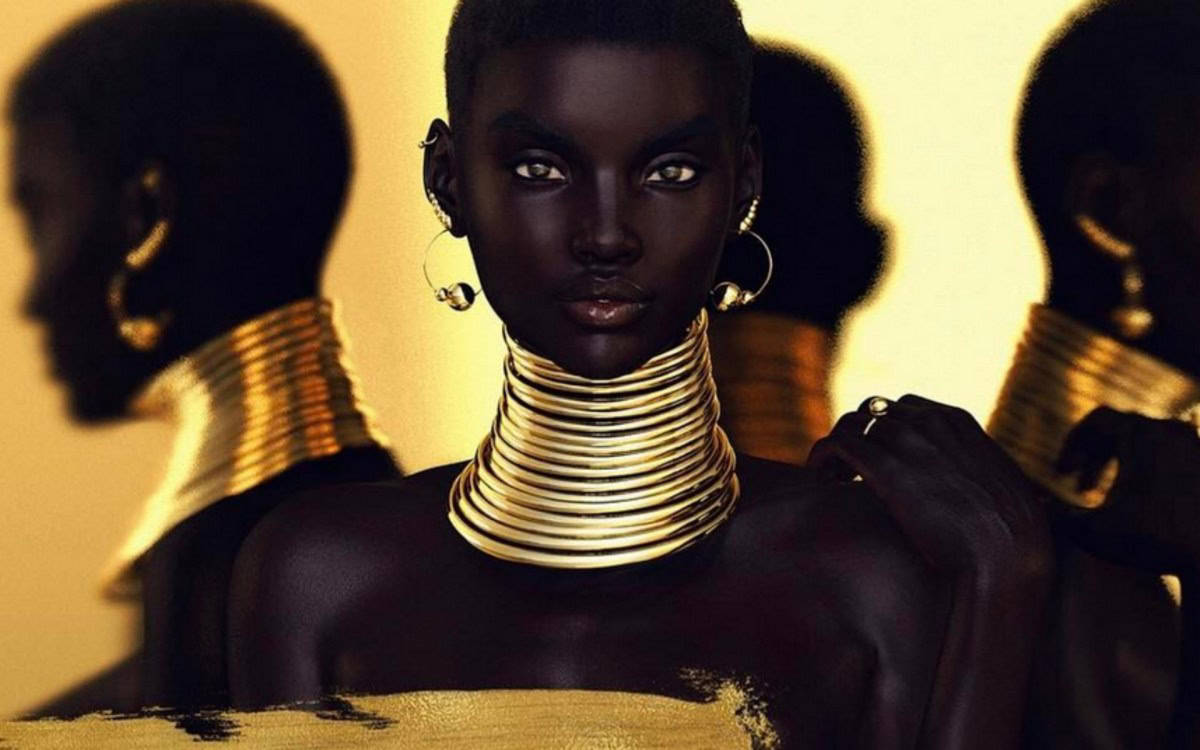We all can recognize the power of social media influencers, but does Shudu create more opportunities for diversity or simply racial plagiarism?
Meet Shudu, the beautiful dark-skinned model that totally gives Queen of Sheba and Grace Jones vibes. There’s one really interesting thing about the model, she isn’t real. Unlike BET’s virtual music show host Cita (Cita’s World) whose stereotypical antics were arguably used as cultural expression for entertainment, Shudu’s origins may be more dubious. Shudu’s luminescent Black skin and beautiful Black curves are the interpretation of London-based fashion photographer Cameron James Wilson. Wilson is a white man. His digital 3D interpretation of a Byte-Sized Black supermodel has thousands of follows and impressions on social media, yet she is his interpretation of Black beauty. The inspiration for Shudu came from the South African Barbie Doll and is a direct result of Wilson exploring his own creative outlet in discussing diversity in fashion. Or in his own words “an exploration of [his] own views and exploring [his] creativity.” Yet does his work border on appropriation? She’s not the first virtual model to make her impact on the fashion world or social media feeds.
In Wilson’s own words:
“We need more pictures, more art, more of everything adding towards representation, not taking away. That’s how I feel.”
However, when does artistic expression end and the exploitation or fetishization of the African woman begin? Wilson argues that his virtual character is supposed to inspire diversity in fashion. The problem is, this is someone not of native African heritage or culture deciding what is beautiful using another race as a canvas. Considering the historic sexualization and fetishization of women of African descent, this could be a problem. Europeans haven’t had the best track record in dealing with the culture and people of the African continent. If you remember Sarah Baartman, the Khoikhoi woman of Southern Africa who was exhibited as freak show attractions in 19th-century Europe under the name Hottentot Venus. She was showcased for her large buttocks and curves as well as being used a sex slave to the highest bidder.
As much as Wilson makes the argument that Shudu encourages brands to see the value in using women of color to promote themselves (the post above is in conjunction with SoulSkybrand); is this taking away from a physical Black woman getting this gig? This could be exposure, fame, and a paycheck going to the Black community, but it isn’t. People argued wouldn’t diversity be helped in general by just actually hiring a woman of African lineage? Wilson claims that the end-goal for Shudu is to partner with developing brands in emerging companies and underrepresented countries. Hiring people from these nations and developing them as positive representations of the lands they originate from would do far better. This could have just as easily been a brand working with Lupita Nyong’o or the next Lupita for the same brand effect.
On the flip side of the coin, Fenty by Rihanna has already done work with the virtual model (see Instagram post above). Her brand cosign had the effect of skyrocketing the dashing digital damsel to upwards of 90K followers. Since Shudu’s creation has sent off a global hunt on where this possible beauty could be (due to the followers who thought or still believed the dark-skinned binary beauty composed of 0’s and 1’s is real). There are many beautiful dark-skinned black girls who see the images of Shudu splashed across the net and furiously double-tapped on Instagram and finally feel accepted. They may finally see themselves represented in a sea of Gigi Hadids and Gisele Bündchens.
In a year where Black Panther sunk the Titanic for most domestic film ticket sales, while simultaneously celebrating power images of Black beauty and heroism in the characters of Shuri, Okoye, and Nakia; representation matters. Is Shudu an extension of that? Does this chocolate posing pixelated persona raise the stock of black women in the eyes of advertisers? Or does her features defined by a white photographer set unrealistic expectations for women of color?
Twitter surely had their take on the presence of social media’s new it girl:
Even models won’t survive , #shudu got more followers than your local beauty queen #digitalmodel pic.twitter.com/V3A9dc1v5n
— it wasnt me (@itwasntmathew) April 6, 2018
The worlds first digital model & she’s black ?? #shudu #her #dope pic.twitter.com/AyjxOY8ZTx
— Ty (@GardenFoxxx) March 28, 2018
The world’s first virtual supermodel. #Shudu is mesmerizing. Hard to believe she is virtual. https://t.co/FSipOH7rMp
— Sarah Evans (@prsarahevans) April 4, 2018
"Becoming an influencer is usually tied to authenticity, and these [CGI] influencers are anything but authentic," @betsywiss on influencer avatars. #Shudu, in particular, is a form of what @minh81 terms "racial plagiarism"https://t.co/3M3Lglven1
— Brooke Erin Duffy (@brookeerinduffy) March 28, 2018
Even models won't survive AI.#shudu #digitalmodel #ArtificialInteligence #supermodel pic.twitter.com/9D0P45YBUK
— Rogue Princess (@montrezniles) April 7, 2018
How do y'all feel about this? #Shudu #Fenty #Rihanna https://t.co/xu1wYBBIsn
— melanin monroe. (@Hope_Carter) March 19, 2018
The world couldn't have gotten a better first digital model. Her name is Shudu.
_#SPICETV #fashion #beauty #lifestyle #womendays #womenappreciation #love #unity #feminism #equality #digitalmodel #shudu ?: @spicetvafrica pic.twitter.com/HrW59nOc4W— SPICE TV AFRICA (@SPICETVAFRICA) March 10, 2018
